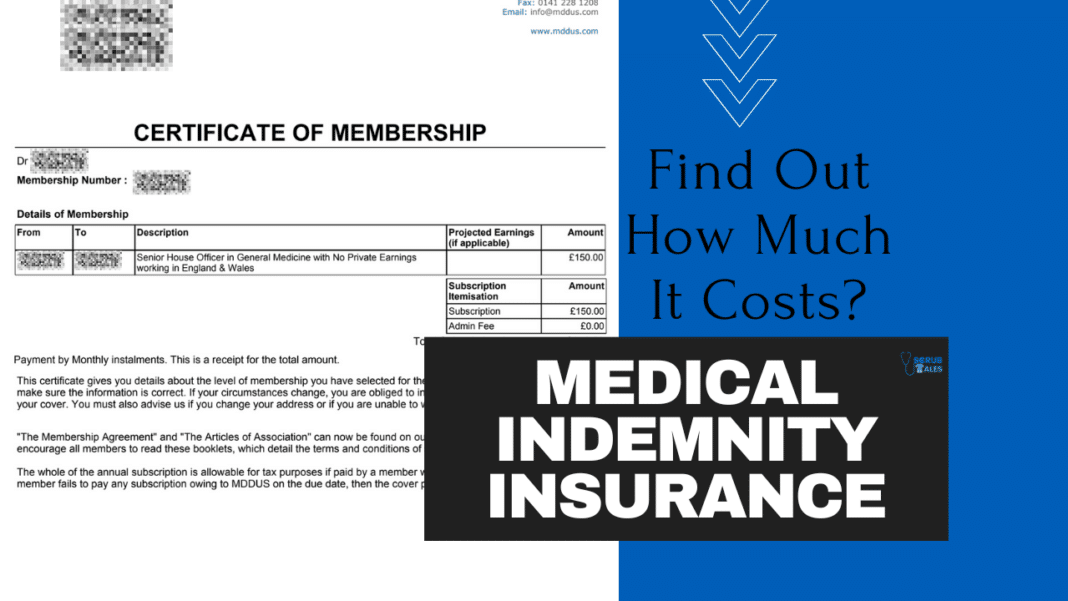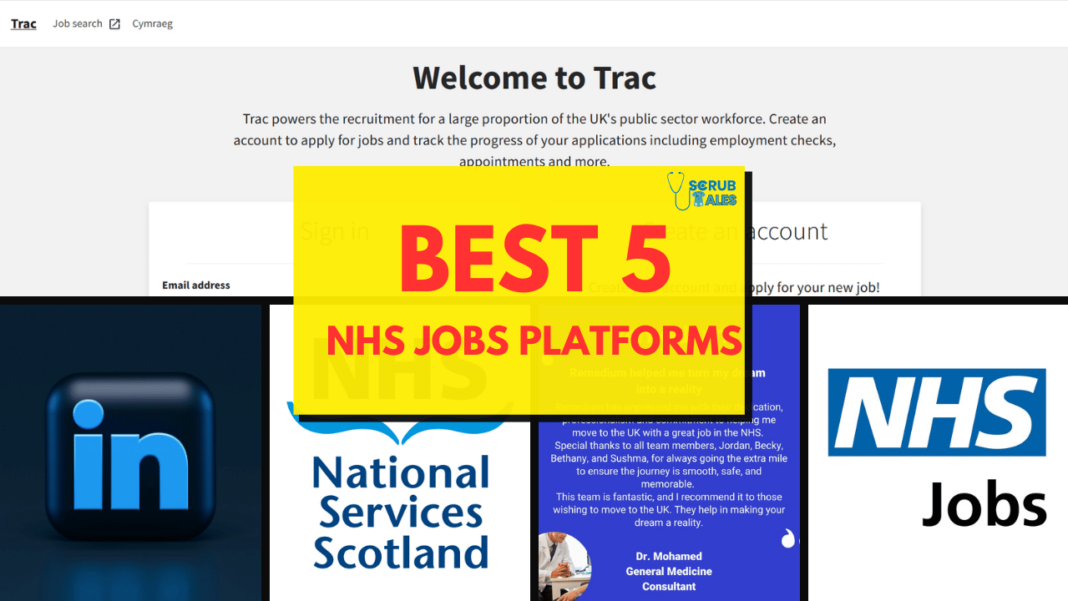The frustration of not landing an NHS job despite clearing both parts of the PLAB exam and getting GMC registration is fairly understandable, but trust me, you are not alone.
Despite our hard work in modifying the trac jobs application with the best supporting information, many still fail to secure a single interview. It is worse, though, for those failing the interviews.
In this guide, I will provide tailored templates and tips to help you write compelling supporting information, so you can confidently apply for your dream NHS role on different platforms. Let’s simplify the process and set you on the path to success!
I will write the guide based on each section in the application process and learn how to apply on the website in the first place:
TRAC Supporting Info Template Download
You can download my supporting information I used on TRAC job applications when applying for NHS jobs.
The information has been anonymised, but it will give you a good idea of how to plan your application:
Webinar
I conducted a webinar on how to write supporting information in the TRAC application for NHS jobs:
Personal Details
This section is straightforward and doesn’t require a detailed explanation.

Personal Details Subsection
- This section includes name, address, and other basic details.
- National insurance number- Found on the BRP, or you can find it here
- Preferred employment- I always tick all of them
Relationships
It’s unlikely that many applicants have this privilege, so this field will remain blank.
Rehabilitation of Offenders Act 1974 (Exceptions) Order 1975 (as amended)
No
Application Questions
This is the only relevant section of the TRAC jobs application where you will work hard to improve your chances of landing your first prestigious NHS job.
On a gentle note, it took me 77 applications before I landed mine. I have heard of individuals submitting over 1,000 applications, only to be stuck for years and still not able to find a single interview.
So yes, this post on the NHS job application guide comes from another nasty experience.
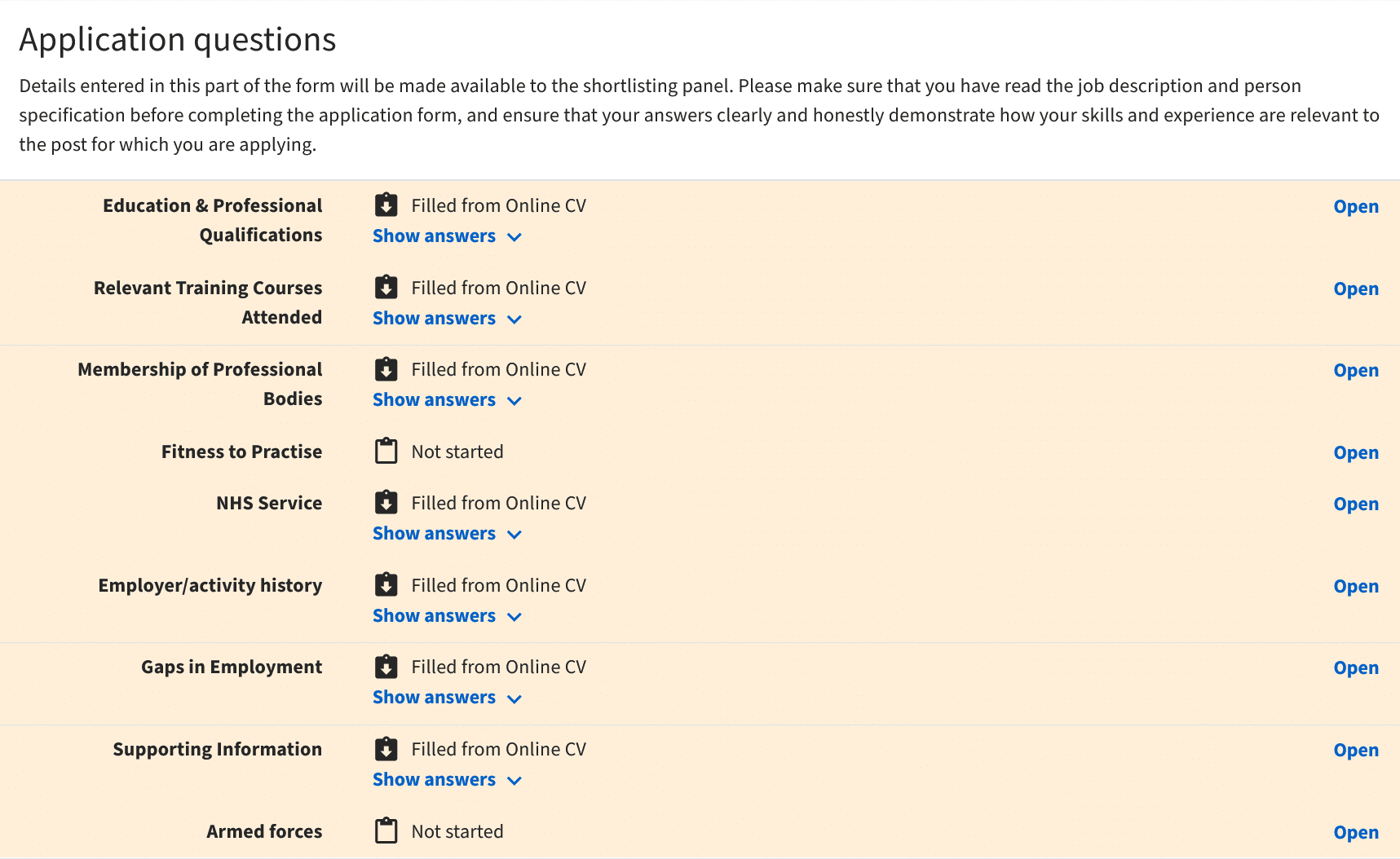
Education & Professional Qualifications
Including relevant qualifications can enhance your NHS job application. Here’s what I added as a junior doctor:

- MBBS
- IELTS
- PLAB 1 and 2
Tip: Some may hesitate to list IELTS as a qualification, but it’s perfectly acceptable to do so. Have you tried Googling the question?
Relevant Training Courses Attended
This section allows you to stand out. Prioritise key courses with valid certificates, especially those related to clinical, leadership, or teaching.
Up to 7 clinical, management and leadership, research, teaching, professional courses that you have done over the past 3 years. You must have valid certificate for the same.
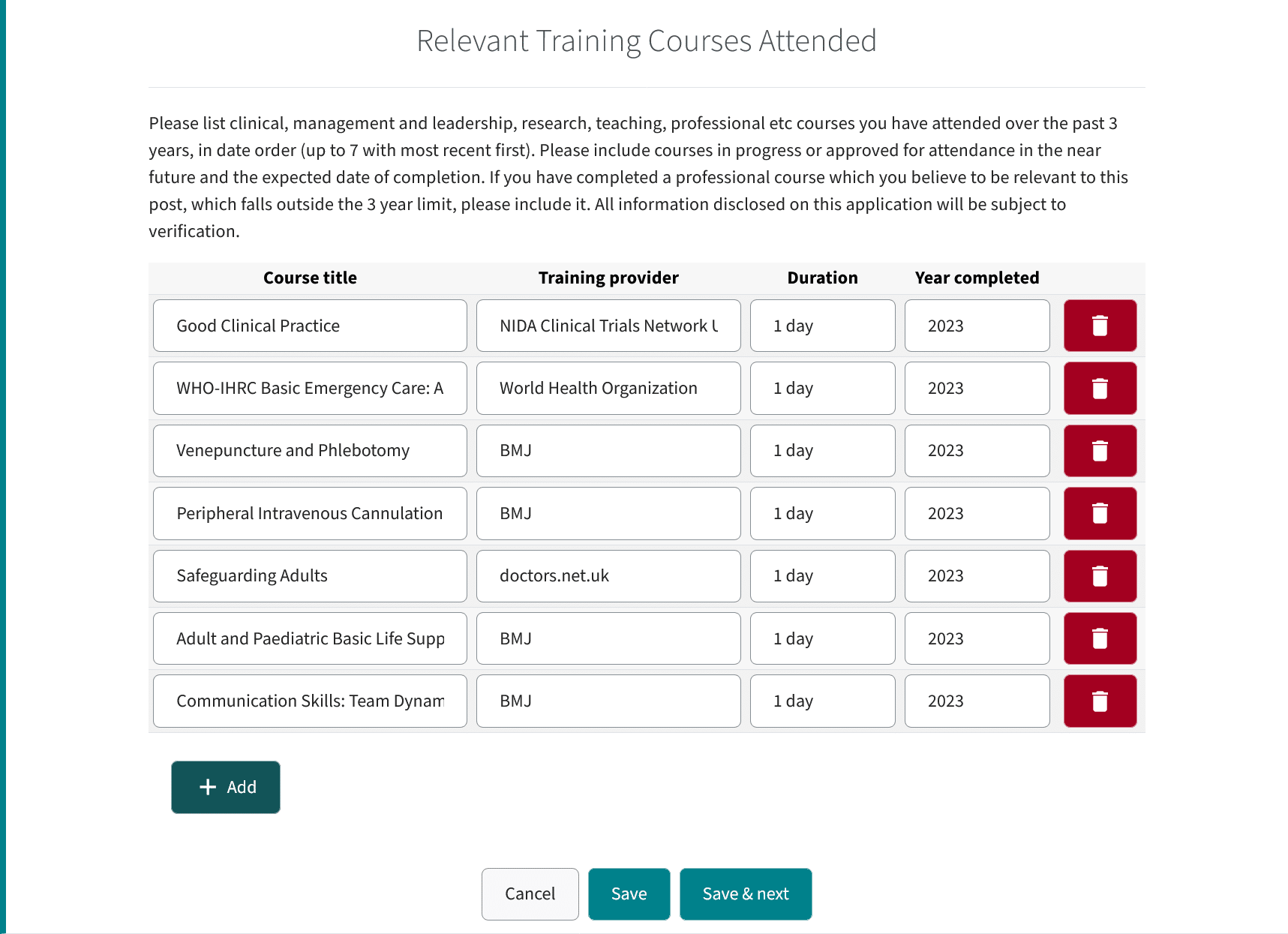
Recommended courses:
- ALS (Advanced Life Support)
- CPD courses (list the most valuable first)
- Teach the Teacher
Membership of Professional Bodies
This section focuses on your GMC registration and other memberships. The only confusion for some is about the professional status.
I will give you my answers to make it easier to understand how I filled out my Trac Jobs application for the NHS job:
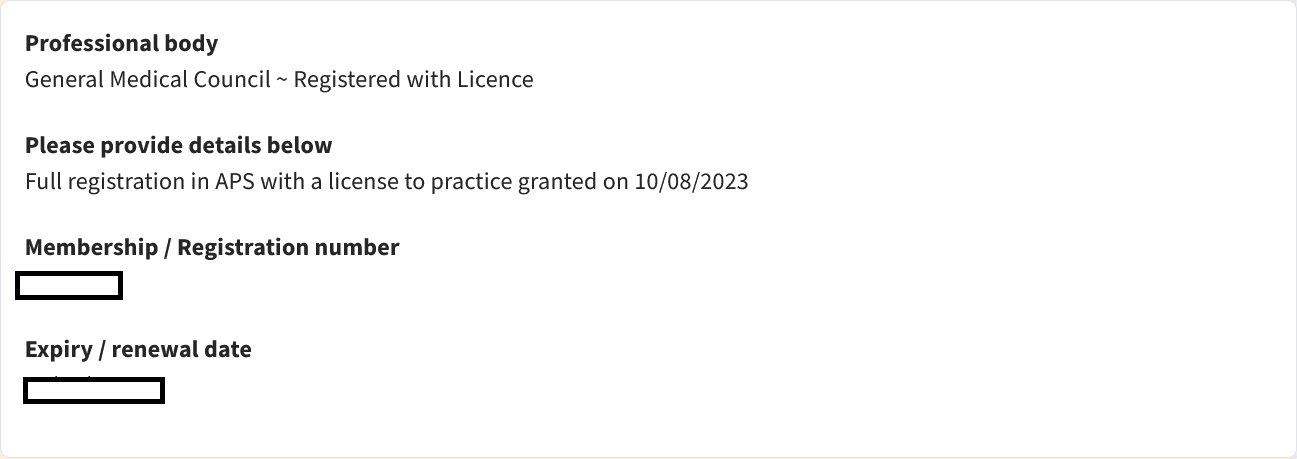
- Please indicate your professional registration status- I have current UK professional registration and a license to practice for this post relevant for this post
- If you have given up a license but have registration, I have current UK professional registration relevant for this post
- Professional body- General Medical Council ~ Registered with Licence
- Status: Full registration in APS with a license to practice granted on DD/MM/YYYY
- Next, you have to give your registration number and expiration date
Fitness to Practise
Usually, the answer here is “No” for most applicants. Double-check before submitting.
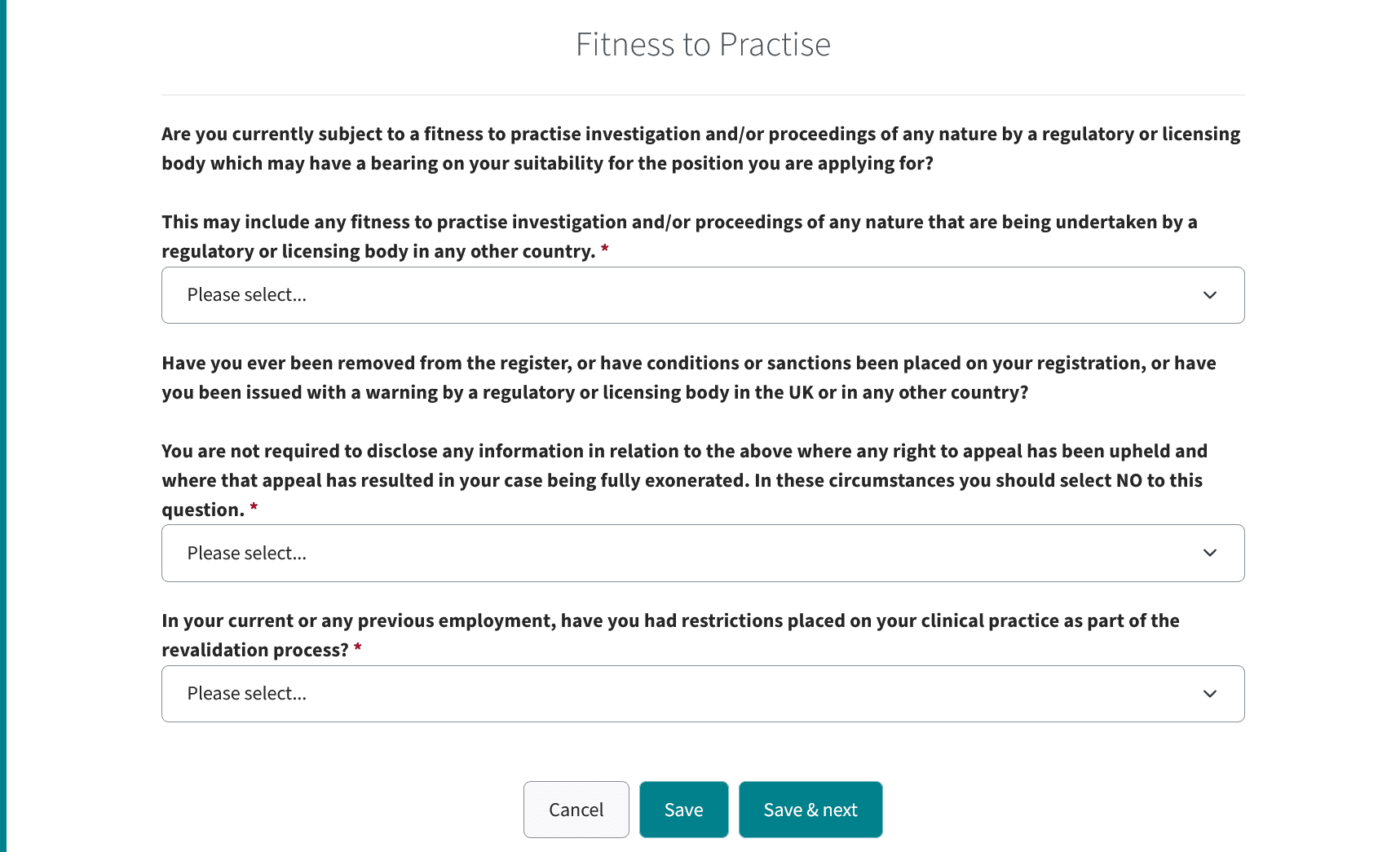
NHS Service
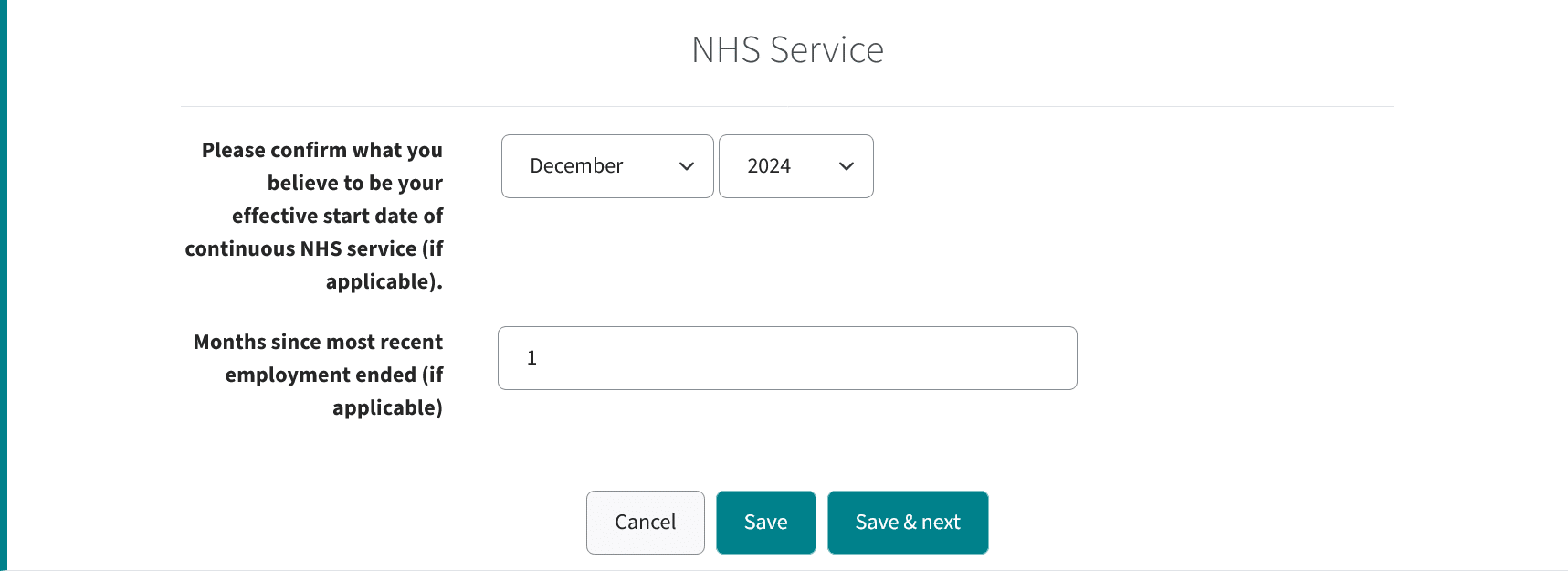
Please confirm your effective start date of continuous NHS service (if applicable). Be realistic; if you’re giving an interview, please pick a date at least 15 days from now.
Months since most recent employment ended (if applicable)- 0 if currently working
Employer/activity history
This section of the Trac jobs application reflects your clinical experience, which is the most crucial aspect of any application you are making.
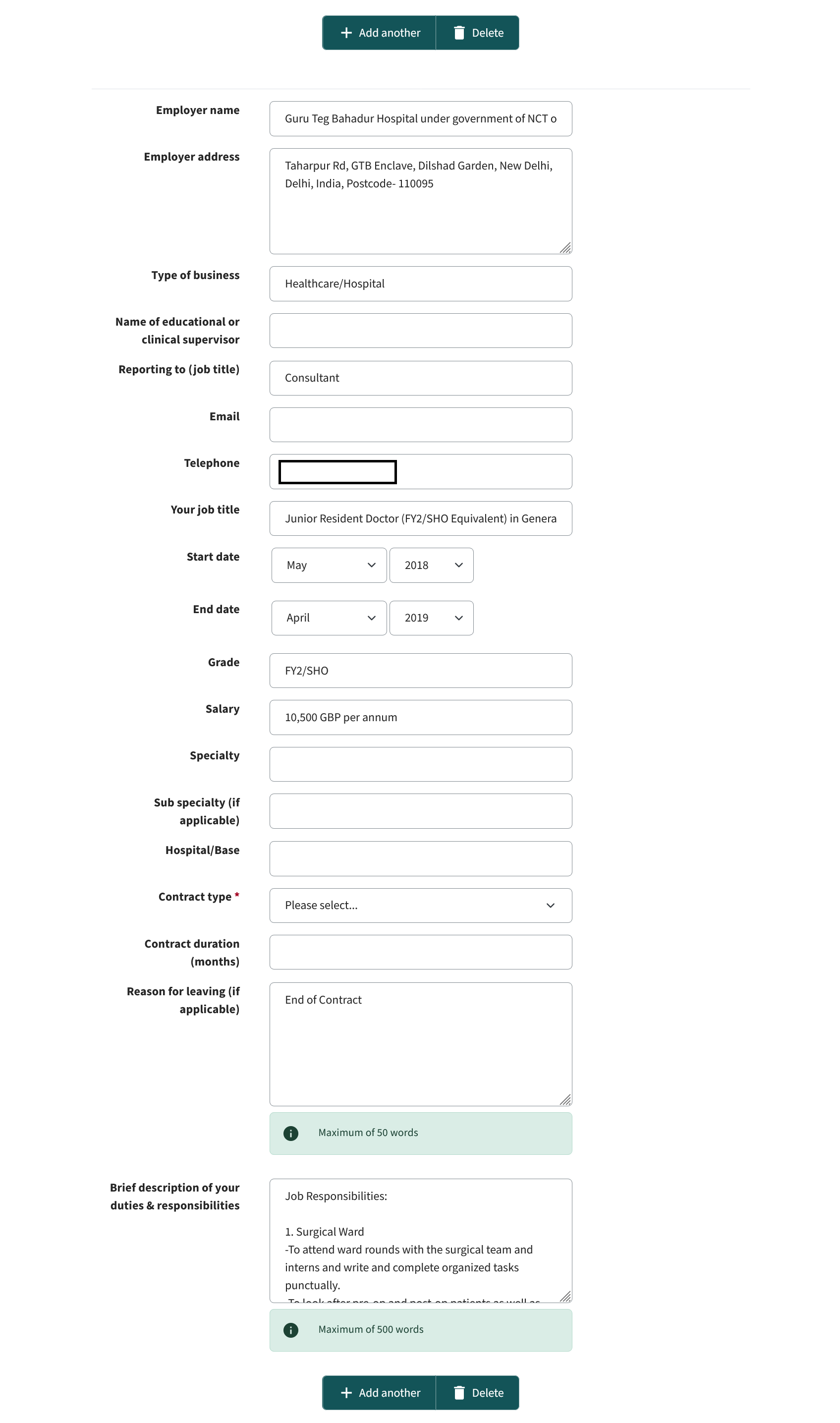
Key Things to Note:
- An education or clinical supervisor is the consultant who is responsible for you if you are not working in the NHS
- Brief description of your duties & responsibilities- Write duties carefully, write in bullet points at least 5, what you were generally doing during the work, try to resonate with the job description of the application you are applying for.
- If you are unsure about the contact details to use when calling or emailing, simply ask your HR department or search online; you will find your hospital’s telephone number.
- For the Internship, the type of business is a medical school. Reporting to the (job title) is all heads of the departments of different specialities. The email is usually for the principal. The job title is Intern (FY1/FY2), the grade is FY1/FY2, and the contract is fixed term.
I was working back in Delhi, India, in one of the government hospitals and following is my template for the description of duties and responsibilities in this section of Trac jobs application:
1. Medicine OPD:
-To assess and evaluate 400-500 patients who arrive at the OPD, establish a diagnosis, and formulate a plan of action that includes
investigations and treatment, all the while enlisting the assistance of seniors to guarantee adherence to established standards.
-To learn and standardize concepts of medicine such as hypertension, thyroid disorders, diabetes, respiratory disorders, cardiac diseases, etc.
-To identify critically ill patients, refer them to A&E for further treatment, document the events appropriately and inform the seniors.
-To prescribe medications including antibiotics based on hospital policy, take a detailed history, perform relevant examinations, document the
findings and write prescriptions as well as counselling patients about medications, diet and exercise guided towards a holistic approach.
-To order relevant investigations, interpret the findings and report them to senior doctors whenever necessary.
-To order TB screening tests and write referrals to TB Clinics for initiating treatment.
2. Diabetic Clinics:
-To evaluate the status of patients, and order relevant investigations such as HbA1c, blood glucose levels, urine and blood ketones, etc. and
interpret the results and document regularly.
-To assess adherence to medications, ensure compliance, write prescriptions under supervision and advice on diet as well as exercise.
- To determine patients requiring admissions or A&E referrals, and ensure prompt actions are taken and seniors are informed.
3. Medicine Ward:
-Attend ward rounds with the consultant and senior doctors, organise tasks for every patient and ensure they are done timely.
-To maintain and update medical records, monitor patients and record vitals in documents, write appropriate drug charts according to hospital
protocols, order investigations, and update seniors of any findings whenever necessary.
-To gain consent for procedures and ensure adequate documentation.
-To counsel patients and their relatives on status updates and queries.
-To write discharge summaries as well as referrals to other hospitals/departments as advised by the consultant.
-To perform procedures such as venipuncture and phlebotomy, cannulation, nasogastric tube insertion, urinary catheterization, etc.
4. Medicine Emergencies:
-To collaborate with the A&E staff, triage and treat patients who are critically unwell when they arrive at the A&E.
-To perform tasks such as urinary catheterisation, nasogastric tube insertion, venipuncture and phlebotomy, cannulation, ABG sampling, CPR,
intubation, etc.
-To administer medications and write medical records in a timely fashion.
-To assess patients by detailed history, performing examinations, assessing vitals, ordering and interpreting investigations, and managing the
cases by prescribing/ administering medications such as adenosine in PSVT, anti-rabies serum in animal bites, oxygen and nebulisers in
respiratory distress, etc.
-To write discharge summaries and counsel patients on medications and lifestyle modifications as well as red flag signs.
-To write death summaries in case of fatalities and inform seniors about the case.
-To write referrals to other hospitals in cases such as Myocardial infarction, trauma secondary to road traffic accidents, etc.
-To write medico-legal cases and update the Chief Medical Officer about the same whenever necessary according to hospital policies.
Here is my template for an internship:
Throughout my internship, I was involved in the following specialities:
1. ENT
2. Elective (Blood bank)
3. Ophthalmology
4. Casualty (A&E)
5. Orthopaedics
6. Paediatrics
7. Community Medicine
8. Obstetrics and Gynaecology
9. Surgery including 15 days of Anaesthesia
10. Medicine including 15 days of Psychiatry
Key Responsibilities:
-To assist senior doctors in managing OPD duties of about 50-100 patients per shift.
-To assist seniors in diagnosing and treating a variety of diseases and injuries in general practice settings.
-To sort, organise and maintain medical records.
-To assist senior doctors with patient checkups and perform basic duties such as writing notes, recording BP, recording glucose levels, etc.
-To improve basic procedures by performing venipuncture and phlebotomy, cannulation, ABG, urinary catheterization, nasogastric tube
insertion, suctioning airway, etc.
-To order and execute diagnostic tests under supervision, interpret results, and report the findings to senior doctors.
-To administer and prescribe appropriate courses of treatment under supervision, including pharmaceutical medications as per hospital policy.
-To advise and educate patients regarding diet, hygiene and effective preventive measures.
-To assist and observe numerous operations to correct deformities, repair injuries, restore function and treat the underlying condition.
-To assist and observe normal delivery and Lower Segment Cesarean Section.
-To prescribe pre-operative and post-operative treatments and perform procedures, such as wound care, diet and antibiotics.
-To treat paediatric patients with minor illnesses, and acute and chronic health problems and address growth and developmental concerns.
-To take follow-ups from nurses about drug charts and vitals and update senior doctors on any concerns.
-To assist in carrying out emergency treatment in A&E according to protocols.
-To continuously maintain patient safety and precautionary measures to avoid disease transmission.
Gaps in Employment
Be realistic and honest, and write in bullet points from and to date.
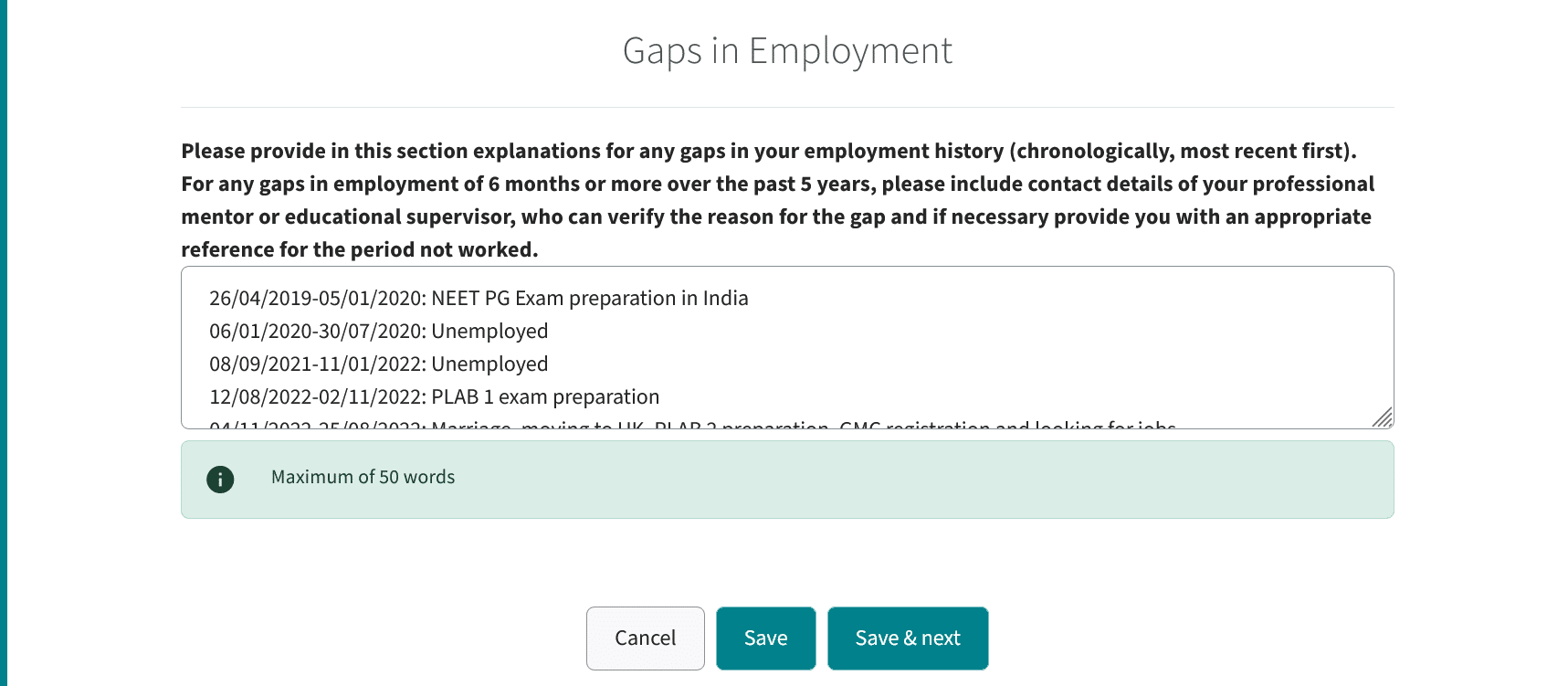
Have a look at mine:
26/04/2019-05/01/2020: NEET PG Exam preparation in India
06/01/2020-30/07/2020: Unemployed
08/09/2021-11/01/2022: Unemployed
12/08/2022-02/11/2022: PLAB 1 exam preparation
04/11/2022-10/09/2022: Marriage, moving to UK, PLAB 2 preparation, GMC registration and looking for jobs
Supporting Information in Trac Jobs
This is the most important section of the Trac jobs application and the one that can significantly improve your chances of landing your first NHS role.
On a personal note, it took me 77 applications before I landed my first job. I’ve heard of others submitting over 1,000 applications or spending years applying without success. Persistence is key.
Declaration of Practical Experience
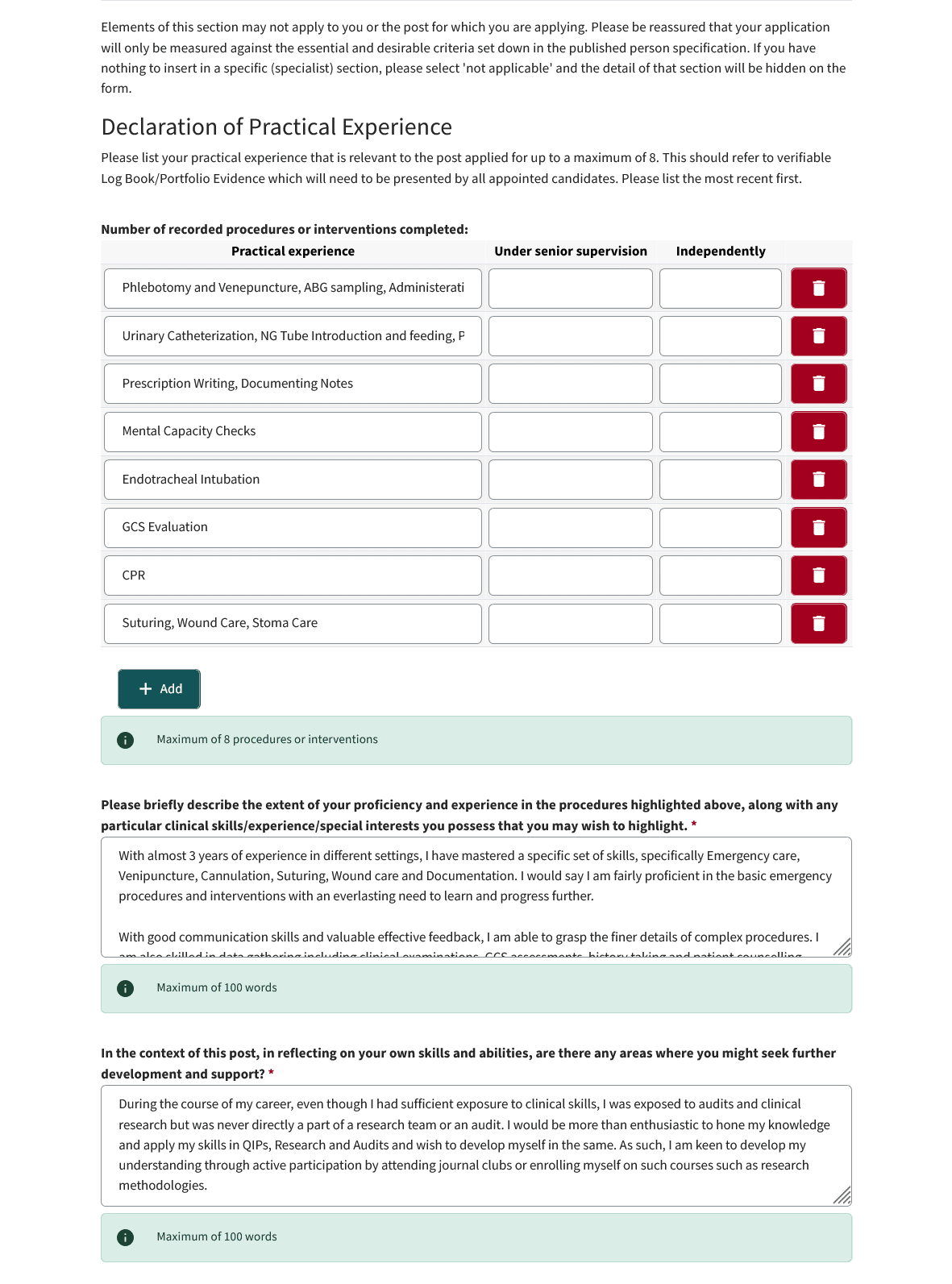
Here is my template on ‘Number of recorded procedures or interventions completed‘:
1. Phlebotomy and Venepuncture, ABG sampling, Administeration of IV fluids and Blood Products, IM and SC Injections
2. Urinary Catheterization, NG Tube Introduction and feeding, Paracentesis
3. Prescription Writing, Documenting Notes
4. Mental Capacity Checks
5. Endotracheal Intubation
6. GCS Evaluation
7. CPR
8. Suturing, Wound Care, Stoma Care
You must have evidence in the form of a logbook or a portfolio. You can ask your hospital to provide you with the same. However, we usually submit it and never get back.
My template for ‘Please briefly describe the extent of your proficiency and experience in the procedures highlighted above, along with any particular clinical skills/experience/special interests you possess that you may wish to highlight’:
I have mastered a specific set of skills, including emergency care, venipuncture, cannulation, suturing, wound care, and documentation, through almost three years of experience in various contexts. I would say that I am reasonably proficient in fundamental emergency procedures and interventions, with an ongoing desire to learn and advance.
I am able to refine the subtler points of complex procedures thanks to my effective communication skills and the feedback I receive. I am also proficient in data collection, including clinical examinations, GCS evaluations, patient history recording, and counselling.
And here is what I wrote in ‘In the context of this post, in reflecting on your own skills and abilities, are there any areas where you might seek further development and support?’ in Trac jobs application (Be realistic again. Don’t sound robotic and pointless):
Even though I had sufficient exposure to audits and clinical research throughout my tenure but was never a part of a research team or audit. I would be more than eager to develop my knowledge and skills in QIPs, Research, and Audits, and I desire to grow in these areas. As a result, I am enthusiastic to expand my knowledge by actively participating in journal clubs or enrolling in courses such as research methodology (completed Good Clinical Practice by NIDA Clinical Trials Network USA and Improving Healthcare Through Clinical Research by NIHR and University of Leeds).
Teaching
Do you have any relevant formal and informal teaching experience?: Pick Yes in this section, and even if you have not done any formal teaching sessions, just provide any informal teaching to other junior doctors or medical students as well during your career.
Here is what I wrote in this section:
As SHO:
During my one-year tenure in General Surgery at Guru Teg Bahadur Hospital and University College of Medical Sciences, Delhi, India, I was responsible for instructing fourth-year medical students and FY1 doctors (interns) on rotation. This included introducing them to skills such as:
-ECG and Chest Xray interpretation
-Proctoscopy and Digital rectal evaluation
-Suturing techniques
-Cannula placement and venipuncture
-Urinary Catheterization
-Stoma placement
-IV fluids calculation
-Wound dressings
As FY1:
During my FY1 posting (internship) at the Rama Medical College in Hapur, India, I experienced fulfilment in training medical students. Throughout my residency, I taught conceptual aspects of medicine and surgery to second to fourth-year medical students, such as:
-Clinical examinations
-ECG and Chest X-ray interpretation
-ABG
-Phlebotomy
-Cannulation
-Systemic Examination
Additionally, I stressed acknowledging the holistic approach and patient-centred care, which are crucial for maintaining excellent practice. My juniors commended me for facilitating active participation and collaboration, as well as understanding the essence of "how to avoid free-riding and evaluation apprehension" in teamwork.
Do you hold any particular qualifications in teaching?
You can write your courses or qualifications here. I used the “Train the Healthcare Trainer” course by NHS Health Education England (5-week course).
Consider the CPD courses available to enhance your Trac Job Application.
Management of Change
Audits and QIPs – these are mostly found among those working in the NHS.
Research
Not for me.
Publications in Peer-Reviewed Journals
Not lucky enough to land one yet.
Presentations
Try to put one for which you have a certificate. Local presentation also counts.
Prizes or Other Academic Distinctions
Throw in the prizes or distinctions you got during med school.
Management and Leadership Experience
Mine is not great, but at least realistic and does not sound AI-generated:
By actively participating in ward rounds, addressing the medical and personal needs of patients, demonstrating an interest in resolving complex scenarios, and actively galvanising actions towards the team's goals, I have demonstrated collective leadership and proven contribution. During my residencies, I received numerous compliments for assisting with the diagnosis of difficult cases, such as intestinal perforation due to a thigh stab wound, TPN-induced jaundice in a post-operative patient, etc.
In addition, I took an active role in coordinating duties, not only with colleaugues but also with nursing staff and healthcare workers, thereby enhancing the work environment. These activities included ensuring infection control, preventing needle-stick injuries, ensuring proper waste disposal, etc.
Furthermore, I instructed FY1 doctors and final-year medical students to guarantee that the collaboration would yield a synchronised result. I frequently encouraged students to discuss their academic performance and areas for improvement. I was able to comprehend the reasons for non-participation by empathising with non-participants and devising an effective strategy for enhancing individual aspects, thanks to a further friendly approach that involved placing myself in their shoes.
When necessary, I am also adept at resolving conflicts within the team. I've always been very good at remaining calm and attempting to find a constructive solution to a problem, such as when dealing with patient relatives who were adamant that their loved one was not receiving proper care or with a registrar whose decisions I believed were not in the patient's best interest.
Team Working
Frequently supporting your bold statements with amazing real examples is the key to catching eyes in these sections. Otherwise, I am unsure how many people review our TRAC jobs application submissions and how much they read.
Effective teamwork is fundamental to delivering comprehensive and exceptional patient care, and I am a firm believer in its value as a healthcare professional. Throughout my medical career, I have demonstrated a consistent commitment to nurturing positive relationships within multidisciplinary teams to ensure the best patient outcomes. I have gained valuable experience in teamwork in General Surgery, involving the Surgical team; Gastromedicine, involving the Medical team; COVID-19 ICU, involving the Critical Care team; and General Medicine, involving the Medical team. Throughout my residency in these specialities, I was responsible for performing my duties with clear communication with the MDT and senior consultants supervising my work.
I also consider the clarity of objectives where everyone's participation is crucial to the team's success. I have made a concerted effort to comprehend everyone's duties and how I can contribute to facilitating efficient teamwork by alleviating evaluation anxiety. I relished forming social bonds with the team throughout my assignments so that I could comprehend how to implement effective leadership. Through active feedback, I was able to expand my repertoire, and my team members gained my trust.
Lastly, I am continually developing through hands-on experience, as I acknowledge that cultivating collaboration skills is essential to my ongoing development as a well-rounded professional. Individuals face difficulties in providing the required scope and complexity of healthcare, but I can contribute to the team's success through my capacity for collaboration.
Supporting Information
Here we are! The most anticipated part of any TRAC job application, right? Let’s break down the process of writing a supporting statement for NHS jobs and explore the tips that can help refine it further.
Create your own Trac supporting statement examples. These tips will help you carve the finest ones. Copying someone else’s is a stupid idea anyway.
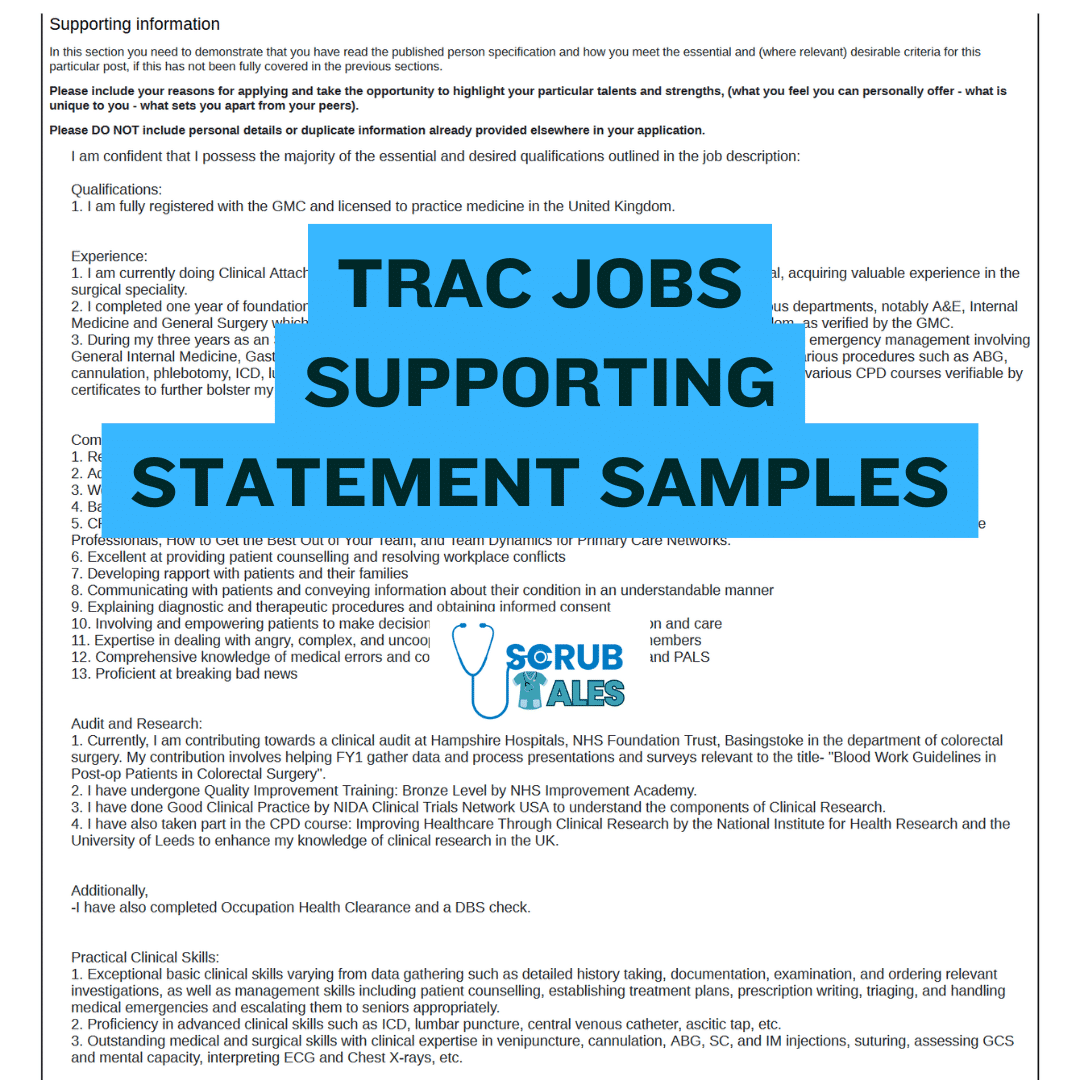
Preparation
- Read the Job Description and Person Specification: Carefully review the requirements, responsibilities, and essential/desirable criteria.
- Understand the Role: Familiarise yourself with the values of the NHS Trust and how the role contributes to the organisation.
Structure
- Introduction:
- Briefly introduce yourself and your current role.
- Summarise why you are applying and your enthusiasm for the role.
- Main Body:
- Prioritise your clinical experience above all else.
- Use the STAR technique (Situation, Task, Action, Result) to provide evidence for each criterion in the person specification.
- Address each essential criterion explicitly, followed by desirable ones if possible.
- Highlight relevant skills, experience, and qualifications.
- Include examples demonstrating your impact in previous roles (e.g., improved patient care, streamlined processes, achieved targets).
- Mention research, publications, audit, and achievements in order.
- Closing Paragraph:
- Reaffirm your enthusiasm and suitability.
- Express willingness to provide further information or attend an interview.
- Throw in CPD courses in the end.
Content Tips
- Tailor Your Statement: Personalise it for the specific role and organisation.
- Quantify Achievements: Use numbers and outcomes where possible (e.g., “Led a team of 10 to achieve a 20% reduction in waiting times”).
- Focus on Key Skills:
- Clinical expertise (if applicable).
- Teamwork and leadership.
- Communication and interpersonal skills.
- Problem-solving and adaptability.
- Commitment to patient care and safety.
- Use Professional Language: Be clear, concise, and avoid jargon.
- Align with NHS Values: Highlight examples demonstrating respect, compassion, teamwork, and commitment to quality care.
Practical Tips
- Proofread: Check for grammar, spelling, and typos.
- Get Feedback: Ask a colleague or mentor to review your statement.
- Save a Copy: Keep a record for future reference. I used to save sections in my iOS notes so I can quickly copy them to new applications.
Sadly, I will not be including my supporting information from my Trac jobs applications. I am unsure how much I can share, so I have limited it.
Armed forces
No again.
References
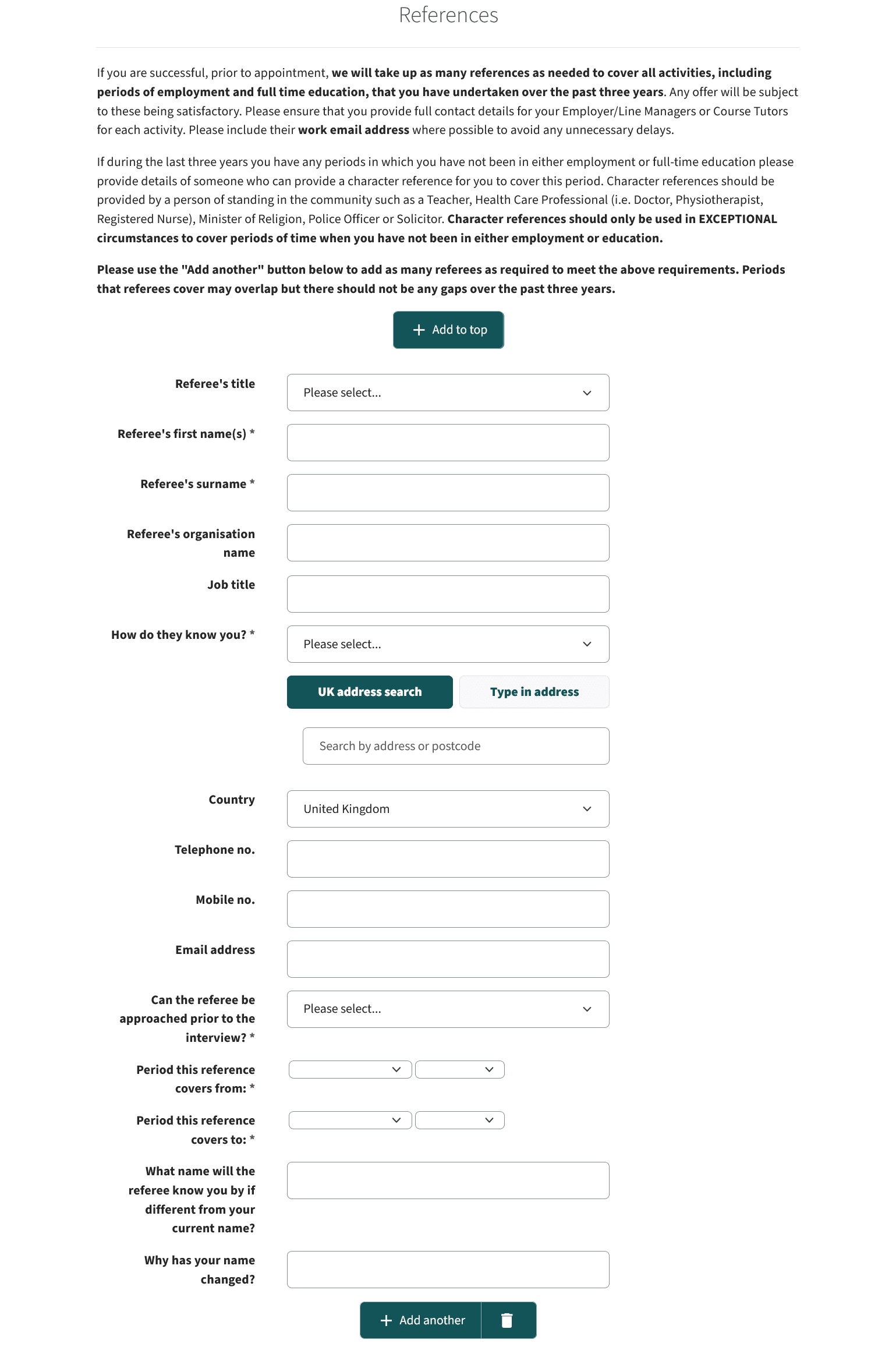
Be in contact with your references frequently. You will need to complete a form that HR sends, and ideally, this should be a quick process.
Sometimes, the email addresses are not working or are wrong. Don’t worry, HR is considerate and will ask you to provide an alternative email or reference if the first one doesn’t work.
Do not give clinical attachment references, as they are not considered clinical work experience. They will be rejected upon successful trac jobs application, don’t waste either yours or your HR time.
General Guidance
- Follow the Application Guidelines: TRAC typically asks for two or three professional references. Ensure you meet their specific requirements.
- Provide Recent and Relevant Referees:
- One reference should usually be from your current or most recent employer.
- If you’re new to the workforce or transitioning, include academic referees or supervisors from placements.
- Professional Relationship:
- References should come from individuals who can speak to your skills, experience, and suitability for the role.
- Avoid personal references from family or friends unless explicitly requested.
Information to Include
- Full Name: Ensure the referee’s name is spelt correctly.
- Job Title: Include their current job title (e.g., “Ward Manager”, “Consultant”, or “Clinical Supervisor”).
- Workplace/Organisation: Provide the name of the organisation where the referee works.
- Contact Information:
- Professional email address (e.g., [email protected]).
- Phone number (usually a work or office contact number).
- Relationship to You:
- Briefly describe how they know you (e.g., “Direct line manager,” “Clinical supervisor during placement,” or “Academic tutor”).
Practical Tips
- Ask Permission First:
- Always contact referees in advance to confirm their availability and willingness to provide a reference.
- Brief them on the role you’re applying for so they can tailor their reference.
- Ensure Accuracy: Double-check the spelling of their name, job title, and contact details.
- Update Contact Details: Verify that the provided email and phone numbers are current.
- Optional Note:
- If you don’t want your current employer contacted before an offer is made, indicate this clearly (e.g., “Please do not contact until a conditional offer has been made”).
Equal Opportunities
Be brief about this section, as nothing to fill in really. The following are the sub-sections you will be going through:
- Equality and Diversity Monitoring
- Disability
- How did you learn of this vacancy?
- Declaration
Final Thoughts: Keep Pushing Towards Your NHS Dream Job
Applying for NHS roles through TRAC Jobs may seem daunting at first, but with persistence, the right strategy, and attention to detail, you can make your application stand out.
The templates, tips, and insights provided in this guide are designed to simplify the process and give you the confidence to showcase your skills effectively.
Remember:
- Tailor your application to the job description and person specification.
- Focus on the values of the NHS and how your experience aligns with them.
- Don’t get discouraged by setbacks—every application and interview is a step closer to your goal.
Whether you’re fresh out of PLAB or transitioning into a new role, the key is to remain consistent and patient. Use the advice shared here as your blueprint, and don’t hesitate to revisit this guide as you refine your applications.
For more tips, resources, and templates to help you on your NHS journey, explore other articles on ScrubTales. Don’t forget to follow us on social media for regular updates and exclusive insights.
Best of luck with your NHS applications—your hard work and determination will pay off!

